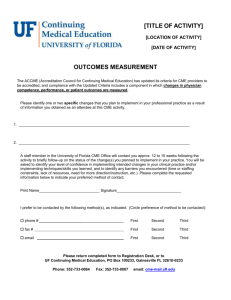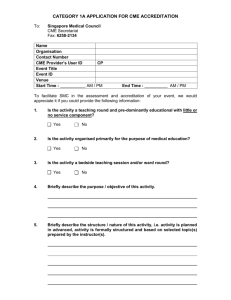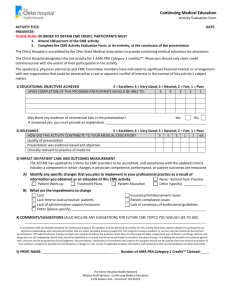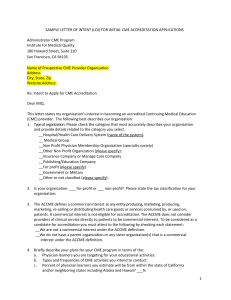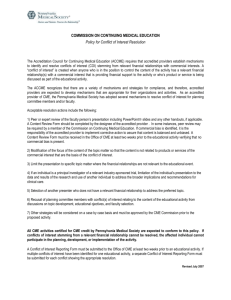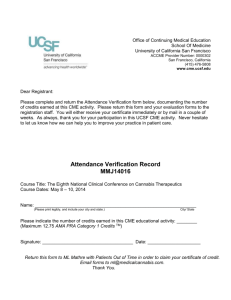Professional Letter - University of Rochester Medical Center
advertisement
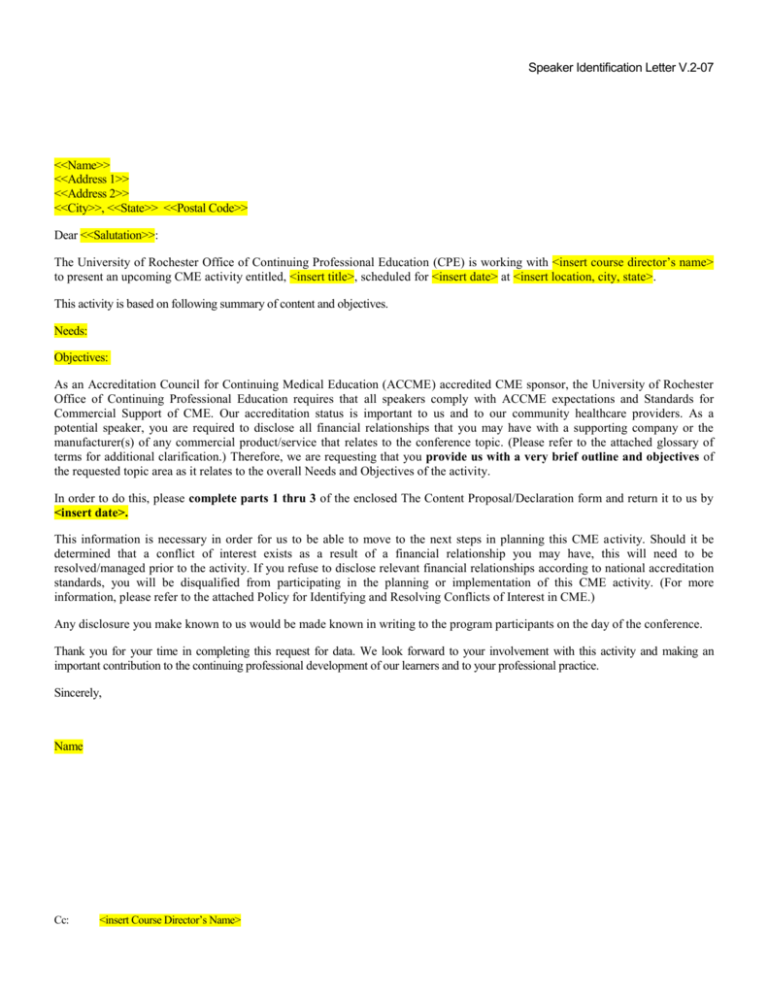
Speaker Identification Letter V.2-07 <<Name>> <<Address 1>> <<Address 2>> <<City>>, <<State>> <<Postal Code>> Dear <<Salutation>>: The University of Rochester Office of Continuing Professional Education (CPE) is working with <insert course director’s name> to present an upcoming CME activity entitled, <insert title>, scheduled for <insert date> at <insert location, city, state>. This activity is based on following summary of content and objectives. Needs: Objectives: As an Accreditation Council for Continuing Medical Education (ACCME) accredited CME sponsor, the University of Rochester Office of Continuing Professional Education requires that all speakers comply with ACCME expectations and Standards for Commercial Support of CME. Our accreditation status is important to us and to our community healthcare providers. As a potential speaker, you are required to disclose all financial relationships that you may have with a supporting company or the manufacturer(s) of any commercial product/service that relates to the conference topic. (Please refer to the attached glossary of terms for additional clarification.) Therefore, we are requesting that you provide us with a very brief outline and objectives of the requested topic area as it relates to the overall Needs and Objectives of the activity. In order to do this, please complete parts 1 thru 3 of the enclosed The Content Proposal/Declaration form and return it to us by <insert date>. This information is necessary in order for us to be able to move to the next steps in planning this CME activity. Should it be determined that a conflict of interest exists as a result of a financial relationship you may have, this will need to be resolved/managed prior to the activity. If you refuse to disclose relevant financial relationships according to national accreditation standards, you will be disqualified from participating in the planning or implementation of this CME activity. (For more information, please refer to the attached Policy for Identifying and Resolving Conflicts of Interest in CME.) Any disclosure you make known to us would be made known in writing to the program participants on the day of the conference. Thank you for your time in completing this request for data. We look forward to your involvement with this activity and making an important contribution to the continuing professional development of our learners and to your professional practice. Sincerely, Name Cc: <insert Course Director’s Name> Page 2 <insert date> Glossary of Terms Purpose of CME: The purpose of Continuing Medical Education (CME) is to facilitate life-long learning among physicians so that their practices may reflect the best medical care for their patients. The goal of CME is to help physicians enhance their performance in practice. All involved in the CME enterprise – educators, meeting planners, faculty, authors, speakers, accredited providers, supporters, and the physician learners themselves – are responsible for fulfilling this purpose and this goal. Commercial Bias: When individuals have financial relationships with commercial interests and are in a position to control the content of CME, there is also the potential for commercial bias. The Accreditation Council for Continuing Medical Education (ACCME) believes that CME must be free of the control of commercial interests. The ACCME believes that this independence from commercial interests will help ensure that CME is free of commercial bias. Financial relationships Financial relationships are those relationships in which the individual benefits by receiving a salary, royalty, intellectual property rights, consulting fee, honoraria, ownership interest (e.g., stocks, stock options or other ownership interest, excluding diversified mutual funds), or other financial benefit. Financial benefits are usually associated with roles such as employment, management position, independent contractor (including contracted research), consulting, speaking and teaching, membership on advisory committees or review panels, board membership, and other activities from which remuneration is received, or expected. ACCME considers relationships of the person involved in the CME activity to include financial relationships of a spouse or partner. Relevant financial relationships ACCME focuses on financial relationships with commercial interests in the 12-month period preceding the time that the individual is being asked to assume a role controlling content of the CME activity. ACCME has not set a minimal dollar amount for relationships to be significant. Inherent in any amount is the incentive to maintain or increase the value of the relationship. The ACCME defines “’relevant’ financial relationships” as financial relationships in any amount occurring within the past 12 months that create a conflict of interest. Conflict of Interest Circumstances create a conflict of interest when an individual has an opportunity to affect CME content about products or services of a commercial interest with which he/she has a financial relationship.
